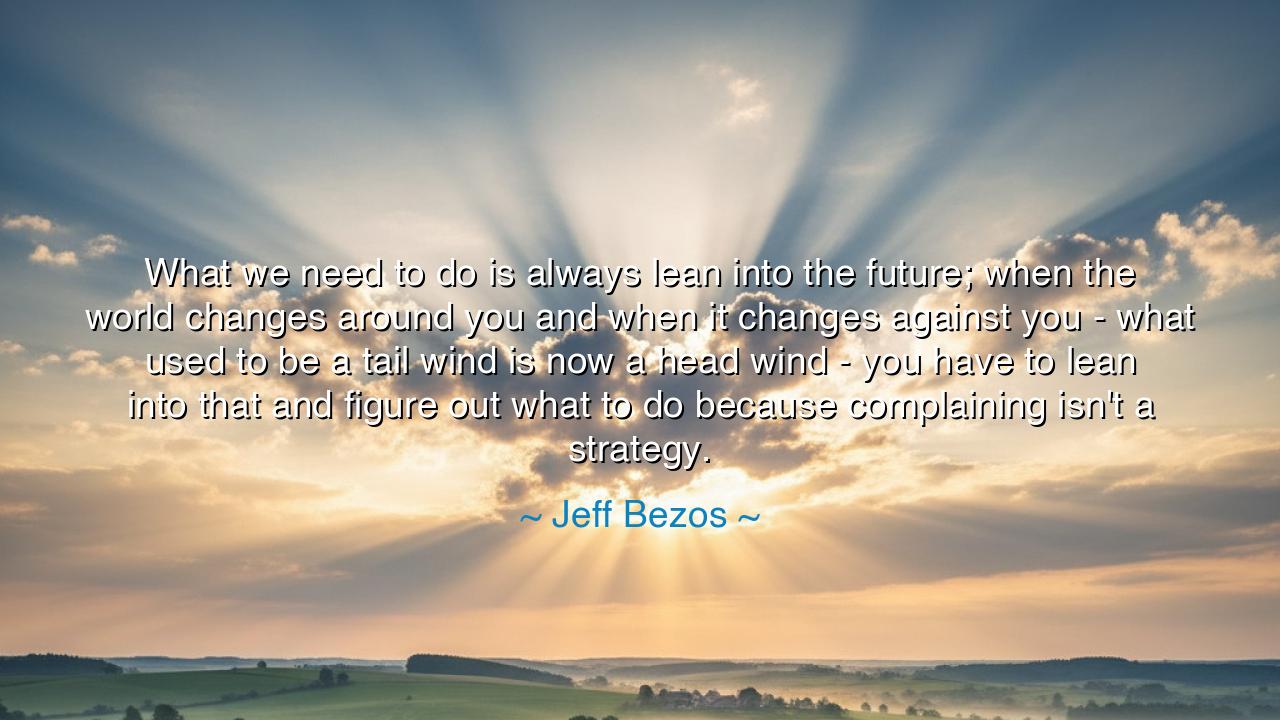
What we need to do is always lean into the future; when the world
What we need to do is always lean into the future; when the world changes around you and when it changes against you - what used to be a tail wind is now a head wind - you have to lean into that and figure out what to do because complaining isn't a strategy.






In the vast and ever-changing river of life, we are all bound to encounter moments when the current shifts—when the tailwind that once propelled us forward becomes the headwind that forces us to struggle. In these moments, when the world changes around us and when forces seem to work against us, Jeff Bezos imparts a timeless truth: "What we need to do is always lean into the future; when the world changes around you and when it changes against you - what used to be a tail wind is now a head wind - you have to lean into that and figure out what to do because complaining isn't a strategy." These words speak to the core of human resilience and ingenuity—the ability to adapt, to find new paths when the old ones no longer serve us, and to take responsibility for our future, no matter the challenges we face.
The ancients, in their wisdom, often spoke of adversity as a powerful force, one that shapes the character and destiny of those who face it. Heraclitus, the Greek philosopher, famously said, "Change is the only constant", reminding us that the world around us is always shifting, like the waves of the ocean. The true test of one's strength, then, is not how one fares when the winds are at their back, but how one responds when those same winds turn against them. Bezos' wisdom, rooted in the realities of the modern world, echoes this ancient truth—when the world shifts, we must not retreat, but lean forward, embracing the challenges and discovering new ways to move forward.
Consider the story of Alexander the Great, who, despite his unmatched success, faced many battles and obstacles that threatened his empire. Early in his conquests, he enjoyed the favor of many, but as he expanded his reach, he encountered new enemies, unfamiliar lands, and unpredictable challenges. Instead of retreating, he adapted. When he faced resistance, rather than complain or seek excuses, he leaned into the challenge, finding ways to adjust his strategies and overcome the obstacles before him. His ability to navigate through adversity and adapt to changing circumstances was a key factor in his success. Alexander, like Bezos, understood that complaints would not solve his problems; only action and innovation could.
Similarly, the Renaissance period provides a powerful example of how the winds of change can either be embraced or resisted. Leonardo da Vinci, a man born in the midst of a changing world, witnessed the rise of new ideas, the discovery of new lands, and the breakdown of old structures. Instead of resisting the changes that surrounded him, he embraced them. He adapted to the demands of the time, using his skills and creativity to push the boundaries of what was thought possible. His work in art, science, and engineering serves as a testament to the idea that when the world changes, it is not a time for complaining but for leaning into the future, for embracing the winds of change and charting new courses.
The lesson here is one of resilience and adaptability. When the world shifts, when the headwinds of adversity blow strong, it is not the time to lament what has been lost, but to gather strength and adapt to the new circumstances. The future, after all, does not wait for us to catch up. We must lean into it, move forward with determination, and find creative solutions to the problems we face. Complaining, as Bezos wisely points out, is a strategy that leads nowhere. It is in the act of action, of moving forward despite the obstacles, that we find our true power.
Just as the ancients knew that the path to greatness is paved with challenges, so too must we embrace this wisdom in our own lives. Adversity is not the enemy—it is an invitation to grow. It is through difficulty that we are shaped and sharpened, like the sword that must be hammered and heated to become strong. The headwinds we face are not obstacles to be feared but opportunities to learn, to adapt, and to reinvent ourselves.
To live according to this principle is to accept the reality of change, to embrace it rather than fight it, and to be constantly ready to lean into the future, no matter the obstacles. The winds may shift, and the world may change, but it is in our response that our future is forged. So, the next time you find yourself facing a challenge, remember: the headwind may seem fierce, but it is also the very force that will propel you forward, if you have the courage to lean into it, to face it head-on, and to adapt with vision and purpose.






AAdministratorAdministrator
Welcome, honored guests. Please leave a comment, we will respond soon